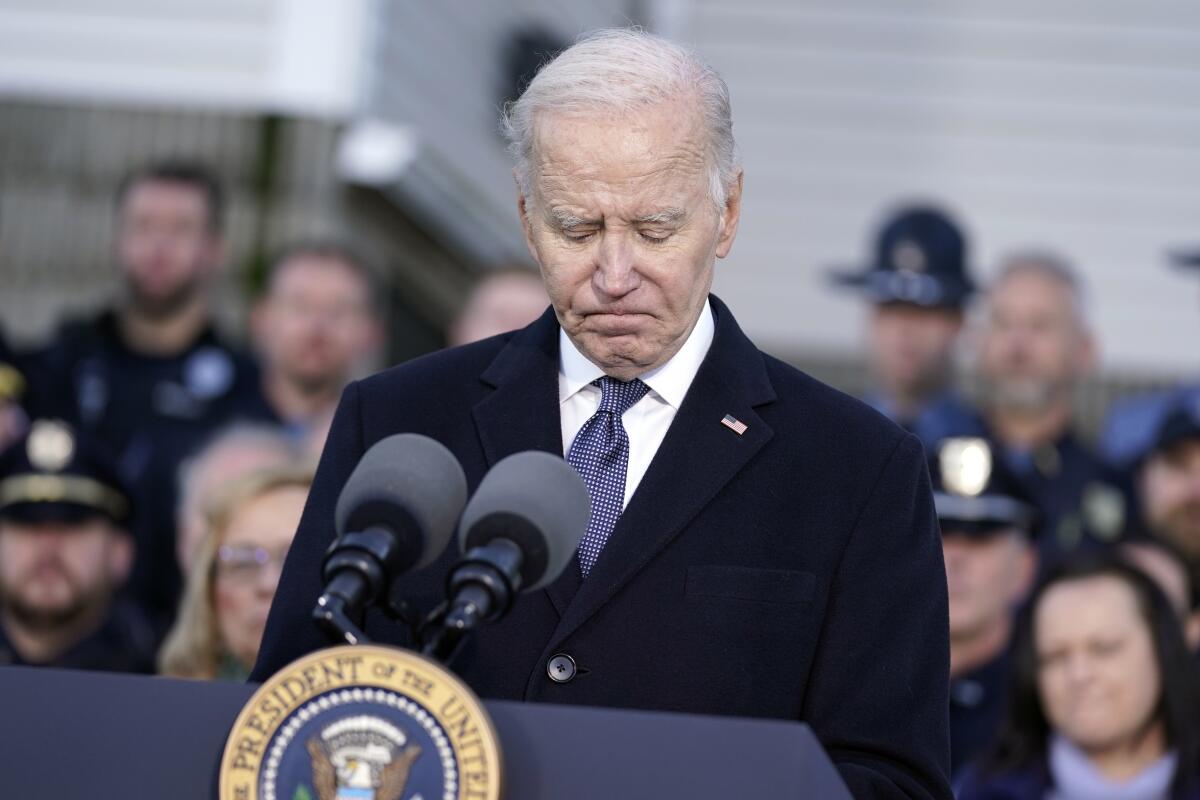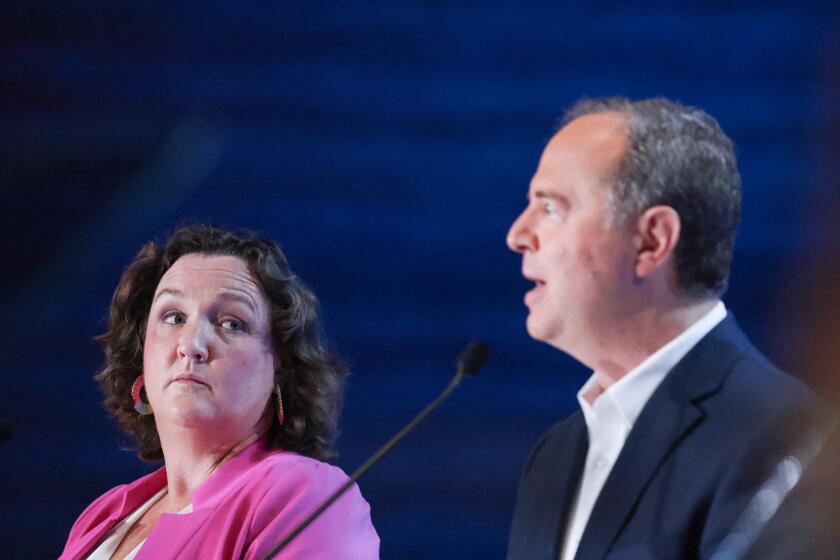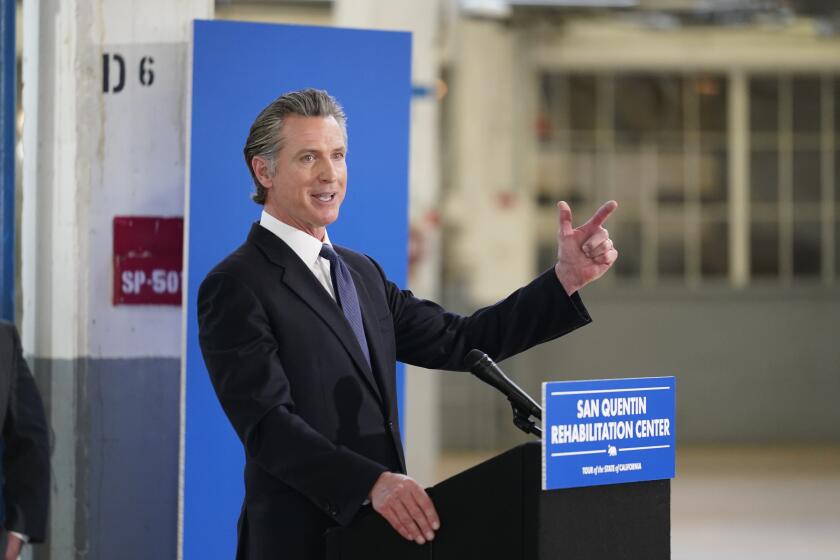Biden support down sharply among California voters for first time in presidency, poll shows

WASHINGTON — For the first time in his presidency, a majority of California voters disapprove of President Biden’s job performance, as support for him has dropped sharply among major Democratic-leaning groups, a new poll shows.
Fifty-two percent of the state’s voters disapprove of Biden’s performance in office, compared with 44% who approve, according to the latest UC Berkeley Institute of Governmental Studies poll, co-sponsored by the Los Angeles Times. Disapproval of Biden has risen 6 percentage points, and approval has fallen 4 points since May, the last time the poll asked the question.
The drop has come heavily from Biden’s fellow Democrats and, to a lesser extent, from the state’s nonpartisan voters. Almost all the state’s Republican voters already disapproved of him.
No single issue appears to fully account for the change: Biden gets poor ratings on several major topics, including inflation, the Israel-Hamas war and immigration.
Specific issues, however, may be the wrong place to look for an explanation: Many voters don’t closely follow news events, but respond to a general sense of how their lives are going.
In 2020, Biden accused then-President Trump of fostering chaos and held out the promise of a return to normal life. Instead, amid inflation and two major wars, the world still feels chaotic, Biden is now the incumbent and many voters are skeptical that at age 80, he’s able to master events. A previous Berkeley IGS-Times poll conducted in late August found nearly half the state’s voters — and 3 in 10 Democrats — “very concerned” about Biden’s age.
The new poll finds that 1 in 4 voters who said they cast ballots for Biden in 2020 now give him a negative job approval rating, up from about 1 in 6 in May.
Women voters and voters younger than 40, two groups that played a major role in Biden’s victory, have gone from majority approval of Biden’s job performance in May to disapproval now. Latino voters, who were evenly split on Biden in May, now disapprove of his work by 14 points, 55% to 41%.
As others struggle for traction in the race for Dianne Feinstein’s seat, it appears to be shaping up as a two-person contest, with Schiff and Porter likely to face off in the fall.
The decline in approval among young voters could be especially dangerous for Biden, said Mark DiCamillo, the director of the Berkeley IGS poll.
In 2020, young voters “turned out in higher than expected numbers and were one of the main reasons Biden was able to defeat Trump,” DiCamillo said. That sort of high youth turnout “doesn’t seem like it’s in play right now.”
“The job ratings get worse as you get younger,” DiCamillo said.
Paloma Polacci, a 19-year-old student at Santa Barbara City College, is an example.
She was too young to vote in 2020, but “after the Obama administration, everyone was sort of geeked to have Biden back in,” she said in an interview Monday.
“But I’m not really sure if I feel satisfied with his presidency,” she added. “I was optimistic in the beginning of his presidency.” Now, not so much.
In heavily Democratic California, such sentiments are unlikely to change the outcome — Biden continues to lead Trump by a hefty margin in hypothetical 2024 matchups, the UC Berkeley-Times poll shows.
And Polacci noted that she, ultimately, would “vote lesser of the two evils. It’s annoying that’s American politics now.”
Surveys show how vulnerable the 80-year-old Biden is as he seeks a second term. But they say precious little about how the 2024 election will turn out.
But the trend of younger voters, women and Latinos souring on the president also shows up in swing states where the contest is much closer. In some recent polls, Biden now trails Trump in hypothetical 2024 matchups.
Even in California, the 15-point lead that the poll shows for Biden would be just half his victory margin of three years ago.
A lackluster showing at the top of the ticket could hurt Democrats further down the ballot. Five California Republicans hold congressional seats in districts that Biden carried in 2020 — one in Los Angeles County, two based in Orange County and two in the Central Valley. Flipping those districts is a major element of Democrats’ strategy for regaining a House majority, but doing so would require a strong Democratic turnout.
Importantly, Biden’s margin is down, not because his voters have moved to Trump — very few have — but because one-quarter of them say they would not support either candidate or perhaps would not vote at all if that becomes the 2024 choice.
“They’re not going to Trump, they’re going to neither or undecided,” DiCamillo said. “It’s almost like they don’t know where to go.”
The election, of course, remains a year away, and history shows that polls this far in advance cannot forecast outcomes; their value lies in describing what voters feel currently.
Both of Biden’s Democratic predecessors, Presidents Clinton and Obama, suffered sharp declines in approval during their third years in office, including steep drops among their fellow Democrats. Obama’s nationwide job approval at this point was similar to Biden’s now.
Both Clinton and Obama turned around their troubles and gained reelection. Biden’s aides say he can do likewise once the campaign is actively underway.
“The Democratic base vote often consolidates late,” John Anzalone, who ran Biden’s polling in 2020, said Tuesday at a panel discussion for pollsters.
The key for Democrats is getting voters to focus on the choice between Biden and the Republican nominee.
That seems almost certain to be Trump. In California as in the rest of the country, he has a huge lead over his rivals for the nomination.
The new poll shows 57% of voters likely to take part in California’s Republican primary in March now say they back Trump, putting him far ahead of Florida Gov. Ron DeSantis, 12%, and former South Carolina Gov. Nikki Haley, 9%, who are roughly tied for second place. Nearly 4 in 10 likely Republican voters backed DeSantis in February; he has lost ground in every poll since then.
Winning more than 50% of the primary vote would give Trump all the state’s delegates to the Republican convention next year. California has the largest delegation of any state.
The prospect of a rematch bothers many voters.
Jeff Wapner, a nonpartisan voter interviewed Tuesday in Santa Barbara, likened Biden and Trump, 77, to his parents, who are in their late 70s.
“They’re incredible people and I love them,” said Wapner, 46. “They should not be running the country.”
“It’s really depressing that we don’t have better options,” he said.
For Biden, turning around his fortunes will require improvements among several groups that played big roles in his 2020 victory.
Two-thirds of California voters younger than 50 say they backed Biden in 2020, the poll found; just 43% say they would vote for him today. The drop is even steeper among Latino voters, from 66% then to 38% now. Biden has suffered somewhat smaller, but still significant, erosion of support among Black voters, from 74% in 2020 to 60% now.
In each of those cases, the poll found no significant increase in support for Trump. Instead, large shares of each group said they remained undecided, would vote for someone else or might not vote.
The dismay with Biden within his party covered a wide range of issues.
The governor’s popularity has tumbled this year as he’s amplified his role in national politics and campaigned outside of California.
In recent weeks, for example, Biden has come under attack from some in the party’s left wing for his strong backing of Israel in its war against Hamas. The poll reflects that: Among Biden’s 2020 voters, 47% approve of his handling of the Israel-Hamas fighting, compared with 43% who disapprove.
Among Biden voters who identify themselves as strongly liberal, 52% disapprove.
That’s strikingly less support than Biden receives from fellow Democrats on two other foreign policy issues — the war in Ukraine, on which two-thirds of Democrats approve of his work, or relations with China, on which nearly 6 in 10 Democrats approve.
But other issues are also in play: Democrats judge Biden equally harshly on immigration and only slightly better on crime and inflation. And while Biden’s Israel stance has alienated some strongly liberal voters, that group, overall, was no less likely to support Biden than voters who identified themselves as only somewhat liberal.
Biden’s campaign so far has put a big emphasis on trying to improve his ratings on the economy. His aides have been frustrated that amid near-record low unemployment, rising wages and strong economic growth, a large majority of Americans continue to rate the economy as poor.
One problem that seems of less concern for Biden is the likely presence of independent candidates on the ballot. The poll tested a Biden-Trump contest two ways — head-to-head and in a four-way matchup including independent candidates Robert F. Kennedy Jr. and Cornel West.
Biden’s margin over Trump was almost identical either way — 46%-31% in the two-way test and 43%-29% in the four-way.
Kennedy, a former Democrat who has embraced anti-vaccine beliefs and other conspiracy theories, got 9% in the hypothetical matchup and drew support almost equally from former Biden and Trump voters. West, a professor and left-wing activist, drew 4%, mostly from former Biden voters or people who did not vote in 2020.
Historically, support for third-party candidates almost always has dwindled as a campaign proceeds.
The Berkeley IGS poll surveyed 6,342 California registered voters, including a weighted sub-sample of 4,506 likely voters and 1,234 Republican likely voters. The poll was conducted online in English and Spanish, Oct. 24-30. The results were weighted to match census and voter registration benchmarks, so estimates of the margin of error may be imprecise; however, the results for the full sample have an estimated margin of error of 2 percentage points in either direction. The estimated margin of error for the likely voter sub-sample is 2.5 points and for the Republican voters, 4 points.
Times staff writer Faith E. Pinho in Santa Barbara contributed to this report.
More to Read
Get the L.A. Times Politics newsletter
Deeply reported insights into legislation, politics and policy from Sacramento, Washington and beyond. In your inbox three times per week.
You may occasionally receive promotional content from the Los Angeles Times.














